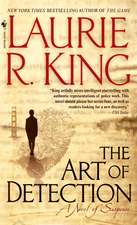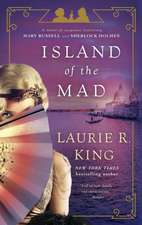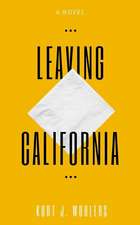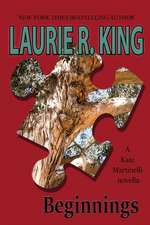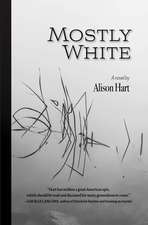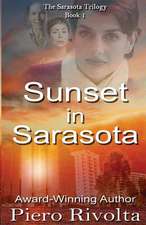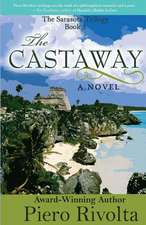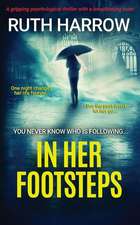Folly: Folly Island
Autor Laurie R. Kingen Limba Engleză Paperback – 30 apr 2002 – vârsta de la 14 până la 18 ani
Vezi toate premiile Carte premiată
Macavity Award (2002)
WHAT HAPPENS IF YOUR WORST FEARS AREN’T ALL IN YOUR MIND?
Rae Newborn is a woman on the edge: on the edge of sanity, on the edge of tragedy, and now on the edge of the world. She has moved to an island at the far reaches of the continent to restore the house of an equally haunted figure, her mysterious great-uncle; but as her life begins to rebuild itself along with the house, his story starts to wrap around hers. Powerful forces are stirring, but Rae cannot see where her reality leaves off and his fate begins.
Fifty-two years old, Rae must battle the feelings that have long tormented her--panic, melancholy, and a skin-crawling sense of watchers behind the trees. Before she came here, she believed that most of the things she feared existed only in her mind. And who can say, as disturbing incidents multiply, if any of the watchers on Folly Island might be real? Is Rae paranoid, as her family and the police believe, or is the threat real? Is the island alive with promise--or with dangers?
With Folly, award-winning author LAURIE R. KING once again powerfully redefines psychological suspense on a sophisticated and harrowing new level, and proves why legions of readers and reviewers have named her a master of the genre.
Preț: 91.84 lei
Nou
Puncte Express: 138
Preț estimativ în valută:
17.57€ • 18.40$ • 14.58£
17.57€ • 18.40$ • 14.58£
Carte disponibilă
Livrare economică 20 martie-03 aprilie
Livrare express 05-11 martie pentru 33.33 lei
Preluare comenzi: 021 569.72.76
Specificații
ISBN-13: 9780553381511
ISBN-10: 0553381512
Pagini: 432
Dimensiuni: 155 x 234 x 24 mm
Greutate: 0.42 kg
Ediția:Bantam Trade Pb.
Editura: Bantam
Seria Folly Island
ISBN-10: 0553381512
Pagini: 432
Dimensiuni: 155 x 234 x 24 mm
Greutate: 0.42 kg
Ediția:Bantam Trade Pb.
Editura: Bantam
Seria Folly Island
Notă biografică
With her debut, A Grave Talent, LAURIE R. KING became the first novelist since Patricia Cornwell to win prizes for Best First Crime Novel on both sides of the Atlantic. She is the bestselling author of four contemporary novels featuring Kate Martinelli, five acclaimed Mary Russell mysteries, and the highly praised A Darker Place. She lives in northern California, where she is at work on the sixth Mary Russell novel.
Extras
One
In fact, Petra had not been the only passenger of the Orca Queen to look back at the sole resident of Folly Island.
Petra Collins, last scion of the once-illustrious Newborn line, certainly looked the longest and waved the hardest at her beloved, bereft grandmother standing alone on the receding shore. The gel that spiked Petra's dark curls felt frozen onto her knit cap, and the puffy coat wrapping her slim, hard body was not really adequate. Poor, poor Gran, the child thought; she looks so lonely Oh man I wish I was as brave as she is all alone on an island with nobody to talk to except the seagulls, not even a dog, I mean I might think about it if I could take Bounce along like that book we read a couple years ago about the boy who runs away to go live in a dead tree in the woods and makes friends with a raccoon and a falcon, I wonder if Gran's island has raccoons? A falcon'd be so cool, though Oh poor Gran, I wish I could stay with her a while Oh jeez it's cold I wish I'd bought her that other hat, five bucks more but it would've been warmer for her she looks so old and cold and Bye Gran. Bye. Bye.
The thoughts rattling through the mind of Tamara Collins were even less coherent than those of her thirteen-year-old daughter. She was struggling irritably to get her cigarette lit against the wind that flung the lighter's flame wildly about. On the way over, that wind had made her eyes water so badly she was now without any mascara, and she knew she looked a sight--not that there was anyone to see her in this godforsaken hole.
She finally got the cigarette going, and an instant before the boat rounded Folly's southeastern point, Tamara glanced involuntarily over her shoulder at her mother, standing proud and straight-backed on the promontory. A pang of sympathy, even pity, sneaked in before her mind came back on-line with Damn it, how long can it be before we get a call from the police or a hospital asking Do you know a Rae Newborn she was found--pick one or more of the following--a) raving at passersby b) starving to death c) bleeding to death Oh God maybe Don was right and we really ought to do something about her but that psychiatrist of hers said Mom has the right to do things that look crazy so long as they don't endanger her or anyone else but how can this not be considered dangerous? I mean, in this day and age what's to stop some nut--some real nut, some violent nut--from walking onto the island and Oh this is going nowhere, I'll have to have another talk with that psychiatrist Hunt, Dr. Hunt and tell her exactly what the situation is here, she can't have any idea Yes Don is right there's too much at stake and I never should have allowed Petra to skip a day of school to come on this fool's errand she's too young to understand and it's a mother's responsibility to protect her daughter just because my mother never did that doesn't mean Oh be fair she couldn't help herself, she never meant to abandon But if she's not responsible for her actions if she wasn't responsible thirty years ago and she wasn't last year either then why should she be allowed to do this completely irrational I mean they'd restrain some delusional person setting off for China in a rowboat how is this any different but No, Mom's not insane and certainly not like that just because she has been in the past but this really is crazy Well not crazy-insane but surely nuts and especially when there's so much at stake Don was right about that and would it really be so bad if we were to take the reins like he says take the reins of the estate and give her a monthly allowance and for sure keep a close eye on her I mean what if she decided to give it all away or something what about Petra? And there Mom stands straight as an arrow all pride and stubbornness and Damn it why do I always have to pick up the pieces for her she's the mother for Christ sake it drives me No it doesn't drive me crazy it makes me so angry something's got to be done here it's just too much it's just-- With that, the tree-covered island rose up and swallowed her mother, and Tamara was looking at nothing more exasperating than island and sea. She did not even know if what she felt was relief or sorrow.
The third party on the Orca Queen was its owner, Ed De la Torre, waterborne taxi and delivery service, amateur philosopher, jack-of-all-trades--particularly those trades frowned upon by the law. Ed was more or less impervious to the cold, his skin so toughened by sun and wind it wore like leather. Even the long, white mustaches, startling against the deep brown of his face, seemed barely to move in the gusts. Impervious, that was how Ed saw himself. And with that thought Ed, too, cast his sea-blue eyes back for a final glimpse of the odd figure he'd deposited on the shore of the uninhabited rock, a figure so lanky and so bundled up against the cold that a man couldn't even be sure of its sex.
All alone with no boat and fast-moving water all around, and what would that be like, living with nobody but the birds, no roof but the sky? Old Henry David would've understood, but then he could walk into town, talk to his neighbors, even had family practically within shouting distance. Hell, I've lived on the Queen for weeks at a time, but I can't remember ever going more'n two or three days without stopping in at a bar or a marina or something. Thomas Merton, now maybe there was a man who'd explain the attraction. It's been a while since I read Merton, maybe I'll dig him out again, see what the crazy monk has to say about solitude.
'Course, even Merton didn't do that great with solitude. It distracted him, made him forget about the possibility of bad wiring in Third World appliances, so he got careless and electrocuted himself.
You could say his solitude killed him. God knows it'd kill me.
Alone, at last.
Rae stood beneath the sagging tarpaulin roof, the knapsack gaping open in front of her, and raised her head, abruptly aware of the sheer size of all that solitude pressing in on her flimsy shelter. For the first time--the first of many, she well knew--cold fear trickled into her heart. What the hell am I doing? I mean, I've done a lot of loony things, but this really takes the cake. I should've been locked up, they should've thrown away the key, how can I possibly--
She brought herself up short. This was no way to begin. She'd known it would be hard, but hard was the only solution.
Distraction, Rae. Keep moving. Like the old World War I song said, bristling with dark trench humor, Keep your head down, boys, and sing. Stop to rest, pause to straighten your back, and a sniper will get you for sure. So keep your head down, Rae, and work.
First things first. She reached into the knapsack and pulled out the topmost object, her tool belt, stiff with long disuse. Absently, automatically, for the first time in a year and a half her hands wrapped the belt around her waist and buckled it, and only when she noticed what she had done did Rae pause to reflect that, although her first thoughts on the island had been of self-destruction, her first act seemed to be one of building. Dr. Hunt would approve.
The psychiatrist might not, however, approve as wholeheartedly of Rae's next action, which was to take out the self-sealing sandwich bag filled with dark soil that she had collected from the center of the redwood cathedral where Alan and Bella's ashes had been scattered. The gray ash of them was no longer visible among the duff; Rae couldn't even make out any of the fragments of cremated bone that she knew were there, but sight did not matter. She went to the front of the tent, studied the possibilities for a minute, and then walked through the sodden grass of the clearing to the wide-spreading madrone tree that marked the eastern edge of clear ground. With the heel of her boot, Rae pounded a shallow depression into the damp soil, and there she emptied the contents of the bag. When every grain was gone, she kicked the mixture of island sand and half-rotted madrone leaves back over the foreign soil, then squatted down to smooth and pat it with her hand. To have come here without something of them would have been unthinkable. But they were here now; one responsibility that she was free of.
Rae felt as if she should say something, if only to give a welcome, but with all the words that had been said over those two, it seemed unnecessary, and at the moment more effort than she could summon. It had been a long two days' drive up the coast with her nurse-cum-baby-sitter, and an even longer seven hours in the company of her daughter. Rae still did not know why Tamara had gone to all that trouble, involving their crack-of-dawn flight to Seattle, a two-hour drive to Anacortes in a rental car, the ferry crossing and then Ed's boat, an hour unloading and standing around in the rain, and now the same journey in reverse, and for what? Because Tamara felt she was saying a final good-bye to her mother? And if that was the case, why didn't she at least hug Rae back, there on the dock? Rigid and unyielding, that was Rae's daughter's attitude toward Rae, had been since Tamara was tiny. Rae knew she was to blame, for abandoning the child to a rigid and unyielding grandmother and . . .
And why had thoughts of Tamara intruded on a memorial for Bella and Alan? Because Rae was tired, she supposed. She had done nothing in particular to wear herself out, mostly sat and stared at a lot of scenery, but she felt absolutely exhausted.
She also felt vaguely aware that she had eaten nothing that day other than a dutiful piece of toast on the ferry. Food, however dismal the prospect, might be a good next step. Food was a habit--without savor and unworthy of any more consideration than shoes on her feet or a daily swipe of the toothbrush--but a recognized necessity, something to put in the stomach to delay the grave for a few more hours. Starving herself to death had never appealed.
She went back to the tarpaulin-room and the knapsack, drawing out the box of matches Tamara had given her (Tamara was smoking again, but Rae had not commented) and the Seattle newspaper that she had picked up on the ferry, and went to fight silence with fire. First construction, now warmth, she thought; surely these were both positive symbols. And if Rae's eyes lingered on the newsprint, first an article about a deadly crash and then one concerning a missing girl in Spokane, she caught herself before she could start to obsess over the sick fascination of other people's catastrophes. She briskly crumpled the pages into the center of the circle of ancient, fire-blackened stones that Petra had regrouped for her and arranged a handful of kindling on top. A match to the corner, and the daily news began to burn.
Once the fire was going, Rae placed the heavy iron grill on the stones. Pawing through the box labeled "Food," she came up with a can of chili. "Utensils" gave her a saucepan, can opener, and spoon. She scooped the beans out into the pan and set it on the grill, which promptly tipped, spilling half the pan's contents into the flames. She rescued what she could, seated the grill more firmly on the stones, replaced the saucepan over the flames, and then carried the kettle over to her water jug to fill it. She brought the kettle back to the fire, and as she was lowering it over the hottest part of the flames, a blue jay screamed directly over her head. She jumped violently: a gout of water shot across the carbonized beans, nearly extinguishing the fire. Rae suppressed the high keen of frustration growing in her throat, and gathered together a second batch of kindling.
While her unappetizing meal warmed, Rae took out a plastic trash bag and began to clear away the litter she'd spotted, spoor of illicit picnickers and campers over the years. She used a rubber kitchen glove to pick up the beer cans and food wrappers, but at the sight of a diet Coke can, she was suddenly seated on the ferry again, across the wide table from Tamara. Neither woman noticed the heavy rumble of the boat or the appearance and retreat of the mist-shrouded islands of the San Juan chain, for Tamara had brought an oversized manila envelope from the shoulder bag she carried and emptied it out with a jerk onto the worn plastic surface.
"These should be the last of the receipts," she told her mother. "Anything else that arrives I'll just readdress to your lawyer. And we sent her a notarized letter to say that we were no longer responsible for paying your bills. Here's your checkbook. You're sure you don't want me to hang on to it for you, in case?"
Tamara could not have caught the brief, cynical question that passed through her mother's mind as Rae took the checkbook, speculating about how Don would lay hands on the family monies without it. Then she corrected herself: Outright theft was not Don's way. Whatever was missing, a careful adding up of numbers would not reveal it.
"I'll leave you as a signatory on the account, but I don't think you'll need to do anything. I really appreciate all you've done, Tamara. I know it's been a pain."
"We were happy to do it." It was always "we" with Tamara. She began to slide the papers back into the envelope. "Was the drive up okay?"
"Long, but good. It's beautiful countryside."
"You should have flown."
"I had too much stuff," Rae told her, giving the ready excuse. Too much stuff, too many phobias, too great a need for a firearm . . . "How is Don?" she asked dutifully.
"He's fine. There's a new health club opened up that he joined, he says he's getting out of shape." The thin horsewoman picked up her diet Coke and took a swallow.
Recenzii
"Acclaimed mystery writer King has crafted a labyrinthian tale that is as haunting as it is touching."
-- People
From the Hardcover edition.
-- People
From the Hardcover edition.
Descriere
Making its paperback debut is a bestselling, chilling tale of a woman who begins an ambitious and desperate undertaking which may transform her life . . . .or end it.
Premii
- Macavity Award Winner, 2002




